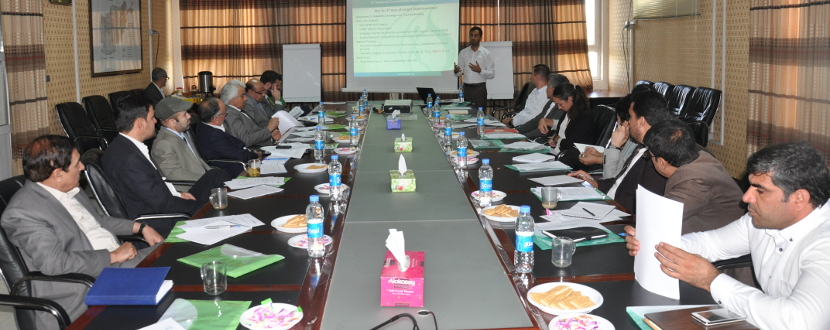riverbp
Network of river basins / Meetings
Working meeting on Smart Waters Project in Afghanistan
 18.10.2017
18.10.2017
Meetings in Afghanistan: Notes are compared with key national partners on the Smart Waters Project implementation and next steps.
On September 30 to October 5, 2017 a series of high level meetings were conducted in Kabul, Afghanistan by the Regional Environmental Centre for Central Asia (CAREC), within the Smart Waters Project financed by USAID. Mr. Rustam Issakhojayev, Deputy Chief of Party, and Mr. Murat Yakubov, Monitoring and Evaluation Specialist, and Mr. Faisal Farjaad, project specialist, conducted a series of bilateral meetings with key national partners to review the progress of the project implementation in Afghanistan, underlined challenges and set grown for future opportunities.
On October 2, 2017 the 3rdNational Coordination Council meeting was conducted with participation of the main project partners in Afghanistan, including USAID, Ministry of Energy and Water, Ministry of Agriculture, Irrigation and Livestock, Ministry of Foreign Affairs, Ministry of Higher Education, National Environmental Protection Agency, Kabul Polytechnic University, Kabul University and others. The meeting was focused on the main findings of the Needs Assessment (NA), recently conducted by the Afghan Research and Evaluation Unit with support from the national partners. Mr. Moh. DaudQazizada, Deputy Minister of Energy and Water of Afghanistan opened the meeting and underlined the excellent level of the project implementation in the country, expressed gratitude for the development of the water sector through education and readiness to fully support the project. Considerable attention during the meetings was given to the role of the national partners. Mr. Rustam Issakhojayev, Deputy Chief of Party, underlined, “Smart Waters Project is committed to working closely with its all national partners by involving them in the joint cooperation, coordination and decision making processes”. Therefore, participatory approach is vital for the projects’ activities and is achieved by sharing its past performance and consulting on future plans. Smart Waters Project specialists conduct national coordination council meetings on a regular basis to ensure interests of national partners to be a part of the project.
During the meeting with the Deputy Minister of Agriculture, Irrigation and Livestock it was underlined that cooperation with other countries of Central Asia should be strengthened, since all the countries share the same history, values and water resources. He emphasized the necessity of introduction of river basin management principles and discussed pilot territories, their challenges and opportunities. The Deputy Minister underlined an important role of education in preparation of highly qualified professionals for the future of the water sector.
Also, participants reviewed principles of integrated water management, underlining the necessity in their introduction for development of water sector of Afghanistan. They agreed that such a comprehensive tool for managing and developing water resources is the only way that balances social and economic needs, ensuring efficient development of water sector for future generations.
In conclusion, it was underlined that the project plays an important role for integration of Afghanistan into the Central Asian region, what is crucial for establishing an effective water resources management for small river basins and sub-basins shared between Afghanistan and neighboring countries. The project ensures improved cross-border collaboration and a shared basic understanding of sustainable resource management practices. During the visit, all national partners in Afghanistan and other stakeholders ensured about their readiness and willingness to work jointly for the benefit of water resources management in the region.

